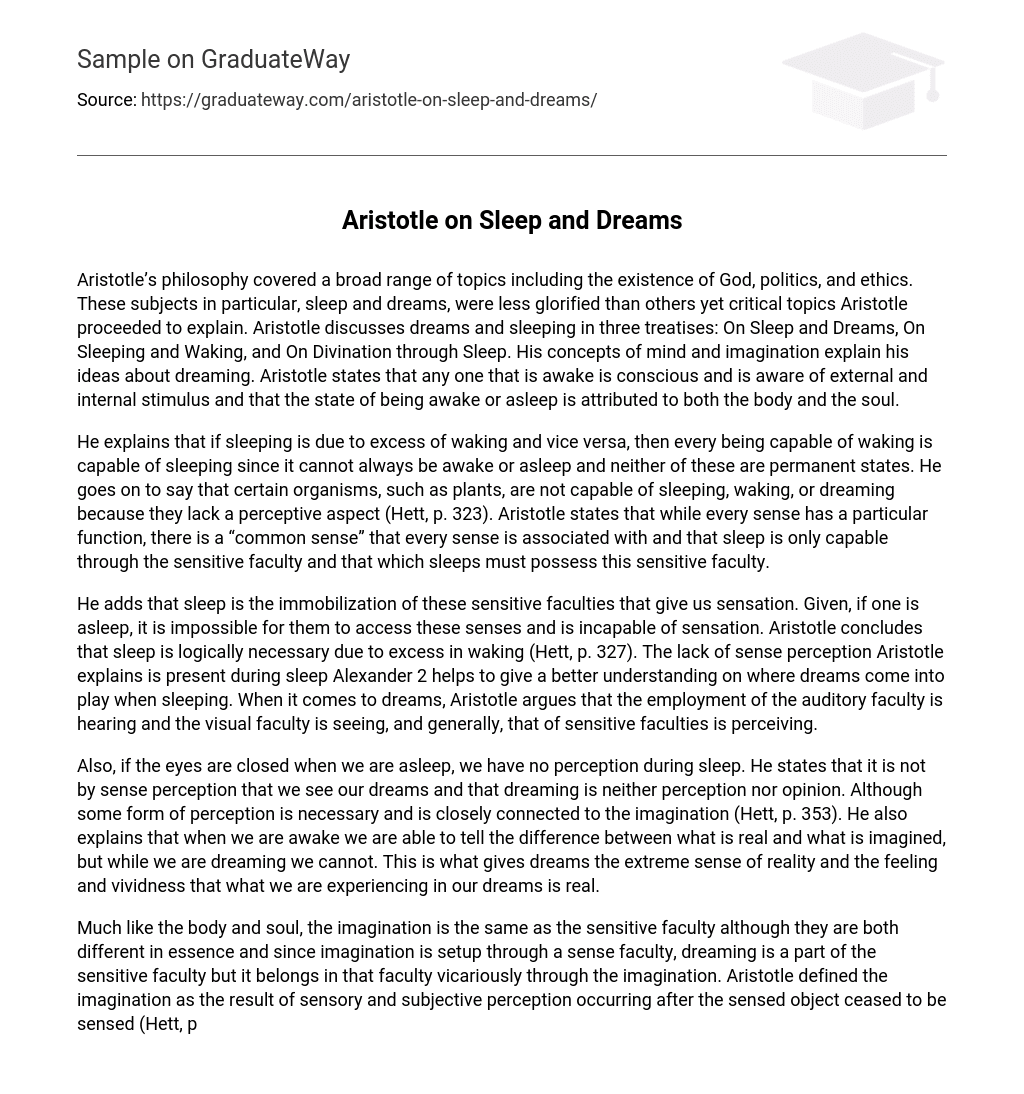Aristotle explored various subjects, such as the existence of God, politics, and ethics, in his philosophy. Among these topics, the significance of sleep and dreams was often overlooked but crucial, and Aristotle proceeded to provide explanations for them. In three treatises, namely On Sleep and Dreams, On Sleeping and Waking, and On Divination through Sleep, Aristotle delves into the subject of dreams and sleeping. By considering his concepts of mind and imagination, Aristotle offers insights into his understanding of dreaming. Aristotle asserts that consciousness and awareness of external and internal stimuli accompany wakefulness, while the state of being awake or asleep is influenced by both the body and the soul.
The author discusses the relationship between sleeping and waking and states that all beings capable of waking are also capable of sleeping because being constantly awake or asleep is not possible. Additionally, the author mentions that plants cannot sleep, wake, or dream due to their lack of perception (Hett, p. 323). Aristotle further explains that each sense has its own function but there is a “common sense” associated with all senses, and sleep can only occur through the sensitive faculty possessed by the sleeping being.
According to Aristotle, sleep involves the immobilization of our sensitive faculties, which are responsible for giving us sensation. When we are asleep, it is impossible for us to access these senses and experience sensation. Aristotle concludes that sleep is logically necessary because it balances out the excess of waking (Hett, p. 327). He further explains that during sleep, there is a lack of sense perception. Alexander 2 contributes to our understanding by discussing the role of dreams during sleep. Aristotle argues that dreams involve the use of the auditory faculty for hearing and the visual faculty for seeing. In general, dreams involve the perception of the sensitive faculties.
According to Hett (p. 353), during sleep with closed eyes, there is no perception. However, dreaming does not involve sense perception or opinion; it is closely linked to imagination and requires some form of perception. While awake, we can differentiate between reality and imagination, a distinction that is impossible during dreams. Therefore, dreams often feel exceptionally authentic and vivid.
The imagination and the sensitive faculty are similar in nature, although they are distinct from each other. Imagination is a result of the sense faculty and is connected to dreaming. Aristotle described imagination as the perception that occurs after a sensed object is no longer being sensed. He also noted that the brain can recreate past experiences through auditory and visual perception.
By utilizing the information from Alexander 3, Aristotle was able to offer a coherent explanation of dreams. According to Aristotle, the objects we perceive generate sensations within us, which continue even after the objects are no longer present. He likens this phenomenon to the way something that is heated also heats nearby objects, creating a chain reaction. Aristotle extends this concept to our sensory faculties, suggesting that it is the enduring nature of these faculties that leads to dreaming.
According to Hett (p. 365), emotions increase our susceptibility to deception and impact our dreams even after they dissipate. Different emotions have varying degrees of disillusionment, with individuals experiencing lower levels of emotion finding it easier to distinguish between reality and imagination compared to those with higher levels.
Aristotle proposes that the perception of objects can create a belief in their existence. He contends that this is because of the differentiation between the sense that perceives these objects and the faculty that handles sensory images. These illusions are primarily influenced by emotions rather than auditory or visual senses. Furthermore, Aristotle asserts that imagination is stimulated not only while awake but also during sleep, often with greater intensity (Hett, p. 361). Alexander 4.
According to Aristotle, residual images exist in the sense organs and they stimulate the imagination (Hett, p. 367). From this, Aristotle concludes that dreams are a type of mental image that originates from the movement of these impressions during sleep. Although the reason for dreaming remains uncertain, Aristotle’s theories about sleeping and dreaming contribute to a deeper comprehension of dreams and lay the groundwork for future philosophers’ thoughts on the subject.





